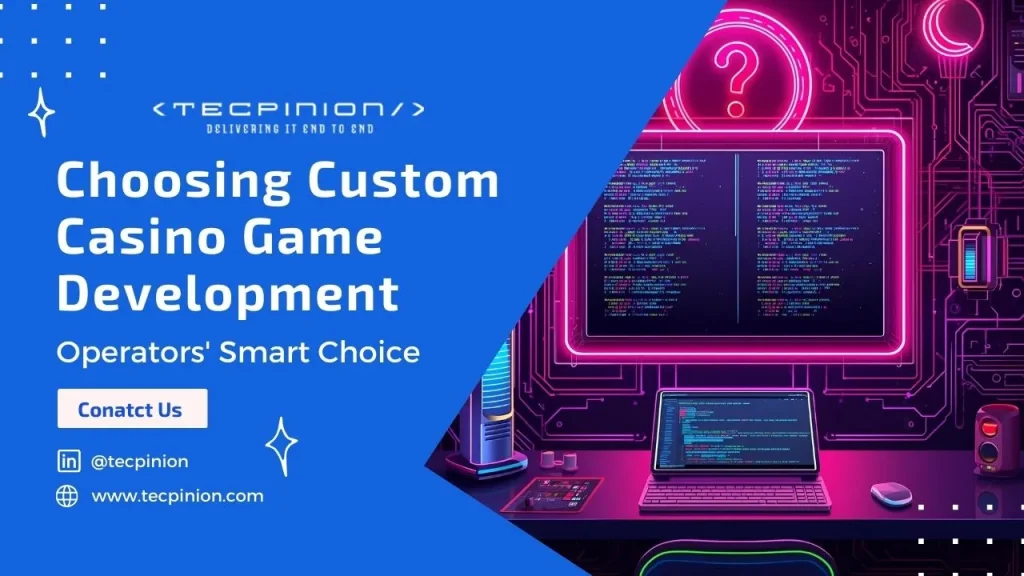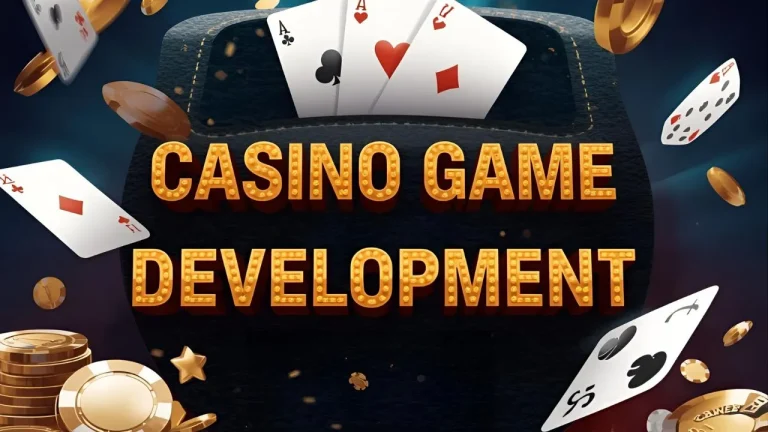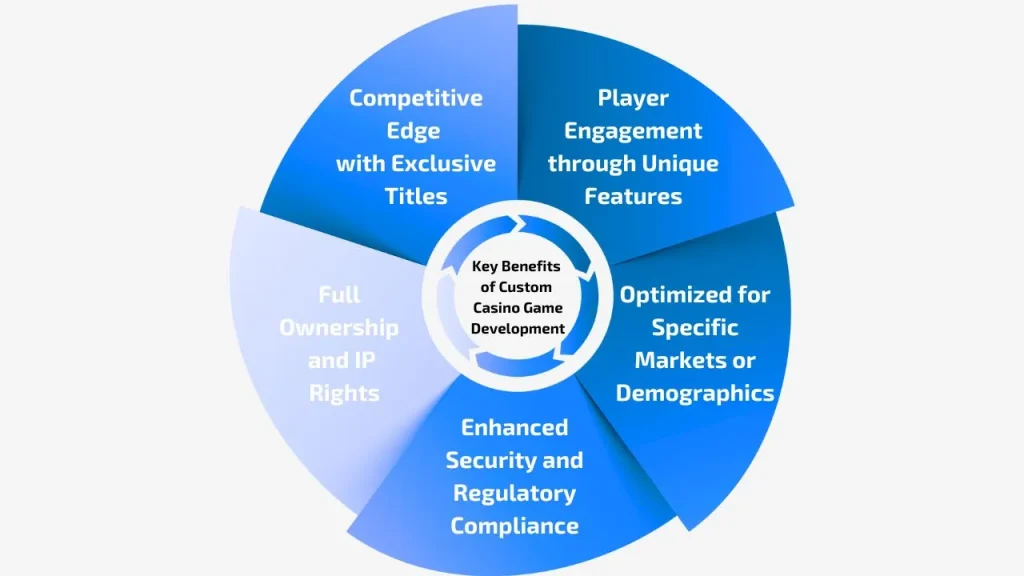Custom Casino Game Development: Why It’s the Smart Choice for Operators

Table of Contents
- Introduction
- What is Custom Casino Game Development?
- Why Operators Prefer Custom Over Off-the-Shelf Solutions
- Key Benefits of Custom Casino Game Development
- Types of Casino Games & Software You Can Build
- Must-Have Features for Custom Casino Platforms
- The Casino Game Development Process (Step by Step)
- Business Models & Monetisation Strategies
- How AI and Emerging Tech Are Transforming Casino Games
- Conclusion: Future-Proofing Your Casino Business
- Why Operators Choose Tecpinion for Custom Casino Games
- FAQs
Introduction
The growth of online gambling and digital platforms has made the casino industry easier to access, more innovative, and more convenient. With millions of gamers playing every day on mobile devices, operators have to compete fiercely and offer gaming experiences that are very immersive, dynamic, and frictionless in order to keep their audiences. Custom casino game development allows operators to create unique, branded games with tailored features, monetization, and compliance controls—driving engagement, retention, and long-term growth. Below, we’ll explain what custom game development is and why it matters. And how can it future-proof your business?
Market Stats:
The global online gambling industry is projected to generate revenues of US$153.57 billion by 2030, growing at a compound annual growth rate (CAGR) of 11.7% between 2024 and 2030.
What is Custom Casino Game Development?

This flexibility allows operators to create games that are both fun for players and adhere to the rules, while also standing out in a crowded market. You can make custom games from scratch or change current ideas, like table games, slots, live dealer experiences, VR casinos, and blockchain-powered games.
For online casinos, gaming studios, and emerging businesses, custom game development is a powerful strategy to attract players, differentiate offerings, and unlock new revenue opportunities.
Why Operators Prefer Custom Over Off-the-Shelf Solutions
-
Unique Branding and Game Identity
1. Custom games show off the operator's brand through things like colors, logos, themes, and stories.
2. They help create a distinctive player experience that builds brand loyalty and recognition.
3. Custom games are different from the generic games that many rivals employ, which makes them stick out and get more attention. -
Control Over Gameplay and Monetization
1. Operators can define the game mechanics, difficulty, RTP (Return to Player), and bonus features.
2. They can also customize monetization models, such as in-app purchases, subscriptions, or token-based play.
3. This control allows for better alignment with business strategies and player preferences. -
Scalability and Adaptability to Player Data
1. Custom solutions can be scaled and modified easily as the user base grows.
2. Developers can integrate real-time analytics and player behavior tracking.
3. This lets operators make the best use of games, promotions, and features based on real player data. -
Better Long-term ROI
1. While initial development costs may be higher, custom games provide a greater return over time.
2. No ongoing license fees or revenue sharing with third-party providers.
3. Full ownership means more freedom to reuse, resell, or expand the product without limitations. -
Security and Compliance Advantages
1. You can make custom-built platforms with advanced security standards that are customized to certain areas or markets.
2. Easier to ensure compliance with gambling regulations, including KYC, anti-fraud, and data protection.
3. Reduces the risk of vulnerabilities present in widely used off-the-shelf systems.
Key Benefits of Custom Casino Game Development
There are several strategic benefits to custom casino game creation that go beyond just making a working product. It gives operators complete control over their games, making sure they fit their brand, market goals, and what players expect. Unlike generic or pre-built solutions, custom games can be fine-tuned at every level—from gameplay mechanics to visual design—making them a valuable asset for long-term success in the highly competitive Gaming space. Here are some of the key benefits:

1. Full Ownership and IP Rights:
- With custom development, the operator keeps all of their intellectual property (IP) rights. This means they may control the game’s design, coding, and future use.
- This gets rid of continuous license expenses and lets you rename, resell, or grow the game as needed.
2. Competitive Edge with Exclusive Titles:
- Operators can differentiate themselves by offering unique games that aren’t available on any other platform.
- Exclusive material draws in new players and keeps current ones interested, providing the casino with an edge over its rivals.
3. Player Engagement through Unique Features:
- Custom games allow for the inclusion of innovative gameplay mechanics, themes, and bonus systems that enhance user experience.
- This personalization results in higher engagement, longer play sessions, and increased player loyalty.
4. Optimized for Specific Markets or Demographics:
- Operators can make games that are appropriate for the language, money, culture, and regulations of certain places or groups of players.
- This localization boosts appeal and maximizes market penetration in diverse geographic areas.
5. Enhanced Security and Regulatory Compliance:
- Custom-built platforms can integrate advanced security measures and be designed from the ground up to meet specific regulatory requirements.
- This reduces legal risks and ensures smooth operation across multiple jurisdictions, especially in regulated markets.
Types of Casino Games & Software You Can Build
Custom casino game development lets operators make games and platforms that are perfect for their target demographic and business goals. It lets you make unique, fun experiences for casual gamers, high-rollers, and tech-savvy customers in a wide range of game types. Here are the main sorts of casino games and platforms you can make:
-
Slot Machines (Classic, Video, Progressive)
1. Classic slots replicate the traditional 3-reel, fruit-style machines.
2. Video slots have enhanced graphics, animations, and bonus rounds that let you play with other people.
3. Progressive slots offer jackpots that grow over time, often networked across multiple games or platforms. -
Table Games (Blackjack, Roulette, Poker, Baccarat)
1. Fully customizable versions of traditional casino table games.
2. Options to include different rule sets, betting limits, side bets, and interactive UI/UX.
3. Can be adapted for single-player or multiplayer modes. -
Live Dealer Games
1. Games like live blackjack, roulette, or baccarat are hosted by real human dealers via video stream.
2. Provides a realistic casino setting and offers features like chat, multi-camera perspectives, and tipping.
3. Popular for enhancing trust and player engagement. -
Sports Betting Platforms
1. Real-time sports betting platforms made just for you in a variety of areas, like football, basketball, esports, and more.
2. Includes features like live odds, in-play betting, bet builders, and cash-out options.
3. Integration with data feeds, payment systems, and user management tools. -
Virtual and Augmented Reality Games
1. Immersive experiences that use VR headsets or AR interfaces to simulate real-world casino environments.
2. Players can walk through virtual casinos, sit at tables, and interact with games or other players.
3. Ideal for next-gen platforms and tech-savvy audiences. -
Social Casino Games
1. Free-to-play games with in-game currencies, friend systems, leaderboards, and sharing features.
2. Made to seem like real-money games without the risk of losing money, they generally make money through adverts or small purchases.
3. Great for engagement, user acquisition, and viral marketing. -
Multiplayer and Skill-Based Games
1. Games like poker tournaments, rummy, fantasy sports, or new concepts blending chance with skill.
2. Encourages competition and social interaction, often with real-time chat and matchmaking.
3. Appeals to younger audiences and markets with regulatory limits on games of chance.
Must-Have Features for Custom Casino Platforms
Making a successful casino platform involves more than just making games. For a smooth, safe, and fun experience for players, the correct features and infrastructure are very important. Every bespoke casino platform should have these important features:
- To be fair, games use verified Random Number Generators (RNGs).
- Players may check the results of games, which builds trust.
- Compliance with regulations helps secure licenses and credibility.
- Works seamlessly on smartphones, tablets, and desktops.
- Fast loading and easy navigation improve user satisfaction.
- Supports multiple languages and currencies for global players.
- Integrates local payment methods and regional preferences.
- Easily keep track of users, games, promotions, security, and money.
- It has KYC/AML features, CRM connection, and access depending on roles.
- Supports credit cards, e-wallets, bank transfers, and cryptocurrencies.
- Fraud detection and PCI DSS compliance ensure safe transactions.
- Watch how players behave, how much money they make, and how well the game functions.
- Helps campaigns work better and find opportunities faster.
- VIP programs, loyalty points, achievements, and rewards increase retention.
- Gamification, like missions, leaderboards, and badges, boosts engagement.
Would You Like to Explore More about Casino Game Development?
The Casino Game Development Process (Step by Step)
Making your own casino game is a difficult task that needs careful planning, technical know-how, and continual administration. Each phase is vital to make sure the game is a hit when it comes out and keeps gamers interested over time. Here’s a look at the usual procedures that go into making an idea into an enjoyable, useful, and legal casino game.
-
Market Research and Concept Validation
1. Analyze industry trends, player preferences, and competitor offerings.
2. Identify target audience, platform requirements, and regulatory constraints.
3. Validate the game concept to ensure it meets market demand and business goals. -
Game Design and Wireframing
1. Create detailed game mechanics, rules, and payout structures.
2. Develop wireframes and UI/UX prototypes outlining the user journey and interface.
3. Plan artwork, sound design, animations, and storytelling elements. -
Development (Front-End and Back-End)
1. Front-end development focuses on building the player interface, visuals, and interactive elements.
2. Back-end development handles game logic, server infrastructure, databases, RNG implementation, and integration with payment and user management systems.
3. Ensure cross-platform compatibility and scalability. -
Testing (QA, Compliance, RNG Fairness)
1. Conduct rigorous quality assurance to detect bugs, glitches, and usability issues.
2. Do compliance testing to make sure you follow the rules for gambling in your area and the rules for your jurisdiction.
3. Validate RNGs and fairness through third-party audits and certifications. -
Licensing and Certification
1. Secure necessary licenses from relevant regulatory bodies.
2. Obtain certifications for software fairness, security, and responsible gaming practices.
3. Ensure ongoing compliance with changing laws and standards. -
Deployment and Integration
1. Launch the game on the chosen platforms (web, mobile apps, third-party casinos).
2. Integrate with existing operator systems such as payment gateways, CRM, and analytics tools.
3. Set up monitoring tools to track performance and user activity. -
Post-Launch Support and Updates
1. Provide ongoing technical support and server maintenance.
2. Release regular updates with new features, bug fixes, and content expansions.
3. Use player feedback and analytics to optimize gameplay and improve user retention.
This step-by-step approach makes sure every part of game development—from idea to long-term support—is done smoothly, resulting in a quality game that players enjoy and that supports business goals.
Business Models & Monetisation Strategies
Depending on the types of players, the state of the industry, and the operators’ revenue targets, they might employ different business models to make money from unique casino games and platforms. Knowing these alternatives can help you make games that keep players interested and make money. This is a list of the most common ways to win money in the casino:
1. Pay-to-Play vs. Free-to-Play (With In-App Purchases):
- In traditional internet casinos, gamers have to pay real money up front to play games.
- Free-to-play models allow users to play without an initial cost but generate revenue through in-app purchases like virtual chips, bonus features, or special items.
- Free-to-play games bring in more players and are widely utilized in social casino games to get more people to sign up and play.
2. Revenue Share and Commission Models:
- Operators partner with game developers or third-party providers on a revenue-sharing basis, splitting the income generated by the game.
- Commission models take a percentage of bets placed or winnings.
- This cuts costs for operators right away and makes sure that everyone is working toward the same goals.
3. Subscription Models:
- Players pay a fixed fee—monthly or yearly—to access premium games or exclusive content.
- Subscriptions can include perks like ad-free gameplay, bonus rewards, or early access to new releases.
- This model ensures a steady, predictable revenue stream.
4. Ads and Affiliate Marketing:
- Integrating ads within free-to-play games generates revenue based on impressions, clicks, or completed views.
- Affiliate marketing drives traffic and player sign-ups through partnerships, earning commissions for referrals.
- These tactics add to previous ways to get money by giving you more ways to make money.
5. Tokenization and Blockchain-Based Assets:
- Using blockchain technology, operators can create digital tokens or NFTs that represent in-game assets, currencies, or collectibles.
- Players can buy, sell, or trade these things, which makes the economy more active.
- Tokenization adds transparency, security, and potential value appreciation for players.
6. In-Game Economies and Microtransactions:
- In games, users buy minor things, upgrades, or bonuses in complicated virtual economies.
- Microtransactions encourage ongoing spending through daily deals, loot boxes, or cosmetic customizations.
- When well-designed, these economies enhance player engagement and maximize lifetime value.
How AI and Emerging Tech Are Transforming Casino Games
AI and other technologies are changing the casino gaming business by changing how games are designed, run, and played. These new features make the game more fun, safer, easier to use, and better at making decisions. This is how:
-
AI for Personalization and Player Behavior Prediction
1. AI looks at player data to make personalized game suggestions, perks, and deals based on what each player likes.
2. Predictive models help operators anticipate player behavior, allowing for targeted engagement and improved retention. -
Machine Learning in Fraud Detection
1. Systems that learn from data always keep an eye on transactions and gameplay trends so you can spot cheating or other shady behavior right away.
2. These tools help reduce fraud, chargebacks, and unfair play, safeguarding both operators and players. -
Blockchain for Transparency and Fairness
1. Blockchain technology guarantees that records of game outcomes and transactions can't be changed, which makes things more open.
2. Provably fair blockchain games let players verify results themselves, increasing trust and credibility. -
VR/AR for Immersive Gameplay
1. Virtual reality (VR) and augmented reality (AR) make casino surroundings very realistic, letting players interact with games and dealers in 3D spaces.
2. These innovative technologies give gamers new ways to interact and have fun that go beyond typical 2D interfaces. -
Chatbots and AI-Powered Support
1. AI-driven chatbots provide instant, 24/7 customer support, answering common questions and resolving issues quickly.
2. They can also guide new players through onboarding, game rules, and promotions, improving user satisfaction. -
Predictive Analytics for Business Insights
1. Operators may find trends, improve marketing efforts, and predict income with the use of AI-powered advanced analytics.
2. This data-driven approach supports smarter decisions across product development, player management, and risk control.
Casino owners may use this cutting-edge technology to make gaming experiences that are safer, more fun, and more personalised. This will suit the changing needs of modern players while also improving the way the casino runs.
Conclusion
As the casino business changes, it’s important to suit the needs of today’s players. Players today want experiences that are immersive, personalised, and frictionless, and they want these experiences to be enabled by technology like AI, VR, and blockchain. Operators can quickly adjust to changes in the market and the law thanks to flexible, scalable platforms. Operators can stand out, keep players coming back, and build their businesses in a way that lasts with custom casino game creation. Online casino games can keep players interested and use data to boost performance and profits by keeping an eye on how they play and introducing social elements.
Why Operators Choose Tecpinion for Custom Casino Software Development
How Tecpinion Helps Operators with Custom Casino Game Development
- Tailored Games – Built to match your brand and audience
- Complete Development – From idea to launch
- Compliance Ready – Meets rules and standards
- Engaging Play – Fresh features and themes
- Scalable Tech – Grows with your business
- Trusted Partner – Focused on your long-term success
FAQs
- How long does it take to build a custom casino game?
Development usually takes 3–12 months, and Tecpinion’s expert team ensures it’s delivered on time and within budget.
- What are the costs of developing casino software?
Costs vary by type, graphics, platform, and compliance. Custom games cost more upfront but offer greater long-term value. Tecpinion provides tailored quotes.
- Is custom development suitable for small operators?
Yes! Small and mid-sized operators can use custom games to stand out and target specific players. Tecpinion offers scalable, cost-effective solutions.
- What about compliance?
Requirements depend on jurisdiction (licensing, RNG, AML, responsible gaming). Tecpinion ensures your platform meets all legal and technical standards.
- Can I integrate third-party games?
Yes. Tecpinion's platforms make it easy to connect with well-known game producers, giving you a wide range of options.
- How do I choose a reliable development partner?
Look for experience, strong technical skills, transparency, and client references. Tecpinion combines iGaming expertise with secure, scalable solutions.


